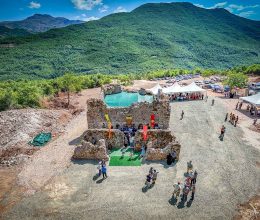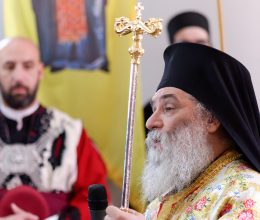A homily by His Grace, Bishop Partenij of Antania, Abbot of the Holy Monastery of Bigorski, at the First Saturday of the Akathist to the Most Holy Theotokos, on March 11th in the Year of Our Lord 2022.

Download sermon to your device
Let us give thanks to our dearest, most beloved Most Holy Theotokos for making us worthy to offer her the first akathist praises, the first words of thanksgiving, “Rejoice,” during this Holy and Great Forty Days.
According to the typikon, the first Akathist is read together with the Gospel, which we heard just now. This particular Gospel reading refers to the dogma of the Holy Trinity and the oneness between the three Persons of the Godhead. At the same time, it highlights a basic, essential principle for all being, first of all, that of the Triune God, and then that of the Church and all Christians. This essential principle is obedience. The Son of God teaches us that if we do not abide in Him, we can do nothing: “As the branch cannot bear fruit of itself, unless it abides in the vine, neither can you, unless you abide in Me. I am the vine, you are the branches. He who abides in Me, and I in him, bears much fruit; for without Me you can do nothing. If anyone does not abide in Me, he is cast out as a branch and is withered; and they gather them and throw them into the fire, and they are burned.” (John 15:4-6). If we are not in obedience to the Son of God and to the order that He has set up in His Church, then we cannot bear fruit or have an existence in God.
The greatest example of obedience was given to us by Christ Himself. Although He is equal to God the Father and the Holy Spirit, He spent His entire life on Earth in obedience. Apostle Paul explains it this way, “Although He was in the form of God…, He humbled Himself and became obedient to the point of death, even the death on the cross” (Philippians 2:6-8). Obedience, then, is what connects the three Hypostases, the three Persons of the one God in their mutual bond of perfect love.
So, my dear brother monks, let us ask our Protectress, the Most Holy Theotokos, to care for us, especially in blessed obedience, to guide us along the difficult, steep path of holy obedience so that we might remain in monasticism, in Christ, and finally bear good fruit. Obedience is not only necessary for our personal salvation, but is of great importance for the whole Church, which we have promised to serve. Undoubtedly, monks should be an example for the people. Our great teacher in monasticism, St. John of the Ladder, expressed it very well in his famous saying, that angels are an example for monks, and monks are an example for lay people. Be careful how you act during your life, in your monastic home. If you fall away from your Elder and obedience, you will never be able to bear good fruit or be a good example. This is because a Bishop of a diocese or the Elder in a community is the likeness of Christ. Therefore, if you fall away from your Elder, from your spiritual father and leader, you are not falling away from a mere man, but from Christ Himself, and can no longer be called a monk. You cannot even be called a Christian. If you leave the Monastery without a blessing, become outside the community which you vowed to live in, commit various iniquities and since, you will not be able to simply say in defense of your apostasy: “Well, maybe it was God’s will that I left.” It absolutely cannot be God’s will. On the contrary, it is nothing but an act of your own self-will and desobediente, causing you to fall away from God and become a stumbling block to all.

Let us ask the Queen of Heaven to give us strength in obedience and to tread upon the path of the Great Fast. We should spend our whole lives in a humble and repentant disposition, just like how we should be during Great Lent. This is just how at the end of this Lent awaits the Promised Land of Paschal Grace on the Feast of feasts, the Resurrection of Christ, so too at the end of our lives, after we lay the grave, the Promised Land of the Eternal Kingdom of God awaits us. This is the purpose of our life on Earth. On that steep road, that long journey, may our Most Holy Theotokos, the special protectress of monks, always be with us by our side. May she give us strength, since as you know, the path we have chosen and to which God’s Providence has called us is not easy at all. Just think of how long and hard the services were this past week. Your legs hurt, your stomach rumbled, your mind was distracted, and your body was weak. This is why we must have zeal because our whole lives will be like that. This fast, the Forty Days of Great Lent is like an image of all of human life, especially monastic life. Constant work, effort, zeal, struggle, podvig, all so that we might reach God. Nothing is easy about it. We cannot inherit the Kingdom with self-will and disobedience. Only those who end their life’s journey laboring for the love of God and in obedience will inherit the Eternal Kingdom, which is Christ Himself. Pray and be of good cheer, abide in Christ, that you may bear much fruit. Amen!
















